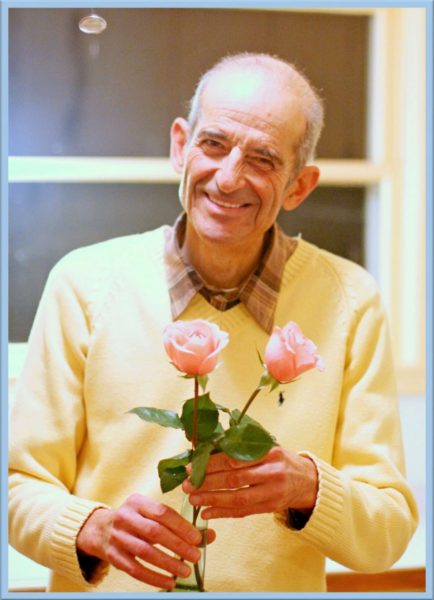At the age of 23, studying on a doctoral scholarship in Germany, I had everything a young man wishes to possess: health, affluence and success. I had come two years earlier from Egypt to a different culture, but the change proved to be anything but a cultural “shock”. As a student, I had rented a room in the apartment of a highly educated woman, who, seeing how much I was taken by classical music, encouraged me to learn piano and introduced me to a German composer and author of some renown, who took up my education in literature and art, beside piano and music. All this was going on parallel to my actual engineering studies. Germany was the ideal place for the intellectually insatiable person I was. Visiting the great German cathedrals and museums with my host, going to concerts, hiking in the Black Forest not far from where I lived, and making trips to adjacent European countries, I felt I was starting to live for the first time. Yet, Germany had much more in store for me….
Having been born in a well known and respected Egyptian family, I had in many ways a privileged childhood. The Islam I grew up with was tolerant, open-minded, and progressive. My grandfather and his brothers had fought against the British occupation: one was exiled to the Seychelles, another jailed in Upper Egypt, but this did not prevent a third brother from marrying an Englishwoman, nor did it prevent the family from sending some of its children to European and American schools, even if they happened to be religious.
I hardly knew my parents: my father, a successful lawyer, was constantly working, and when at home, he, like most men of his generation, was not in the habit of spending much time with his children. My mother complained incessantly from breathing difficulties and kept to bed most of the time. The care of the children was left to a nurse and other help personnel. My father had collected a marvelous library in his study: leather-bound volumes of classical Arabic literature, side by side with French and English books regularly sent to him by bookstores in downtown Cairo. I must have been seven, when I started to sneak to this otherwise rarely frequented study, shut the door behind me and lose myself in whatever, at my age, I could make out of its treasures. The study soon became my magical world, a world of adventure, heroism and beauty to which I could take refuge whenever I felt lonely.
The sunshine of my early childhood was soon to give way to mounting clouds. The 1952 revolution changed Egypt dramatically; and, in the “nationalization” wave that followed, my family lost most of its possessions. Soon after my father died suddenly with a heart attack. With the onset of puberty not long after that my exile from Paradise was complete. I experienced for the first time real anguish and sorrow. A sort of chronic “bad conscience” took hold of me and made me go around with bent shoulders as if carrying a crushing load. The feeling I often had of being lifted up and soaring on wings was gone. Life became a challenge that had to be met with a great effort of will. In my college years, I studied with ferocious determination. Excellence at school, was the one expectation my father had again and again stressed to his children. Unconsciously I wanted to fulfill his wish, but my more urgent need was to get a scholarship that would enable me to study abroad and to discover a wider and more stable world. At the age of twenty, my wish was granted: I completed my engineering studies and received a scholarship to do graduate work in Germany.

So here I was in Germany avidly pursuing venues of which I didn’t have the faintest inkling only a short time before. One day, flipping through the books of my host, I grabbed an inconspicuous book with the title “Der Integrale Yoga”. Till then I had thought yoga nothing more than extreme “physical exercises” developed in India, and I looked in the book for the usual photos of yogis in impossible postures. Instead I found dense texts with long sentences and difficult Sanskrit words. The book turned out to be a compilation[1] of texts by Sri Aurobindo and the Mother, of whom I had never heard before. I put the book back on the shelf; I had anyway a huge list of other things I urgently needed to do. There was no reason for me to return to this book, but I did return to it again and again in the following weeks. It was destined to trigger a turning point in my life.
The words of Sri Aurobindo and the Mother had something comforting and non-threatening about them. They were about a “psychological” spirituality, which was different from the occult and ascetic spirituality I had read about so far. The texts were objective reports of experiences; there was in them no eagerness to convince, no promises of easy and fast rewards and no threats of terrible consequences if one chose to drop them and go other ways. There was no mention of sin or regret over past mistakes; they talked only of restoring harmony and balance and putting each thing in its right place. They taught that a soul could not be lost forever but only delayed in its growth and evolution; and that man’s goal was to participate consciously in his own evolution and to hasten it according to his capacities and means. But there was something else that attracted me to the book: I was much intrigued and perplexed by the authority and the sublime height from which Sri Aurobindo and the Mother were writing: something in their assertions seemed “simply too much”, and yet the doubter in me could not dismiss statements that sounded so authentic and true, as exaggerations and pretense. I wanted to get to the bottom of it all, and I was conceited enough to take the matter as a challenge and to tell myself: “Here is a challenge for you!”
The teachings of Sri Aurobindo and the Mother filled an emptiness inside me that all my previous intellectual pursuits had not been able to fill. I finally understood that true growth should be the growth of the being as a whole, and that true knowledge was not just knowledge of the mind but also that of the heart and the soul. The goal was far and high, but the path was clearly shown; I just had to step on it and start walking.
Outwardly things were shaping up nicely for me. Inwardly the words of Sri Aurobindo and the Mother had started to ferment. And then something strange happened.
I had just finished the first half of my doctoral program and had all reasons to celebrate. Instead, I suddenly found myself in a severe depression, the kind that makes you afraid to leave bed in the morning and that haunts you with suicidal thoughts the rest of the day. No one understood what was happening, nor did I understand what was going on inside me.
In one of my most desperate moments, I remembered the Integral Yoga book. I looked at Sri Aurobindo’s photo and felt a faint but unmistakable quiver in my heart, upon which I fell in a sound sleep, something I hadn’t been able to do for quite some time. Next day I knew I was mending, and things started to change. The change was slow and hesitant at first, but I somehow managed, in a month or so, to get over my depression and to resume normal life.
A great and long adventure had started for me; for decades demolition and construction went on simultaneously inside me, and my path meandered in totally unexpected ways. My journey made me change country and career several times and meet people whom I never imagined I would meet in real life. It was not always easy to fulfill my previous commitments while aspiring to give myself fully to a new orientation and a distant aim. The discrepancy between the Ideal and the Reality was still too great, and my inner resistance created hardships. Most difficult of all, was my inability to make myself understood by those whose lives were closely bound with mine, and who were necessarily affected by my moves.
On the whole my lot was much better than that of millions of others, and I was not asking for more. Slowly the pieces of life’s huge puzzle started to fall one after the other into place. To my amazement I discovered that, despite my many meanderings and aberrations, I have landed not too far from where I always wanted to be. I started to see how every leg of the long journey had been a necessary preparation and to perceive the incredible Grace that has guided me through many detours and much stumbling to the “niche” that was all along intended for me. Life started to become simple and serene; the need for straining and effort grew less; the conflict between “Inner work” and “outer work” lost its edge; the fears and worries that had long haunted me began to fall away; and I started to grasp faintly what Sri Aurobindo must have had in mind when he wrote his “Life Divine”.
I am approaching my seventieth birthday, and my hope seems increasingly justified that the exile from Paradise I experienced almost sixty years ago was not final after all.
Zackaria Feb., 2012
[1] The compilation and translation was done by Heinz Kappes, who later translated most of the major works of Sri Aurobindo into German.
This above essay was originally posted at http://sriaurobindo-inarabic.com/, which contains several bi-lingual selections from works of Sri Aurobindo and the Mother, which Zackaria translated into Arabic, as well as several other essays.




